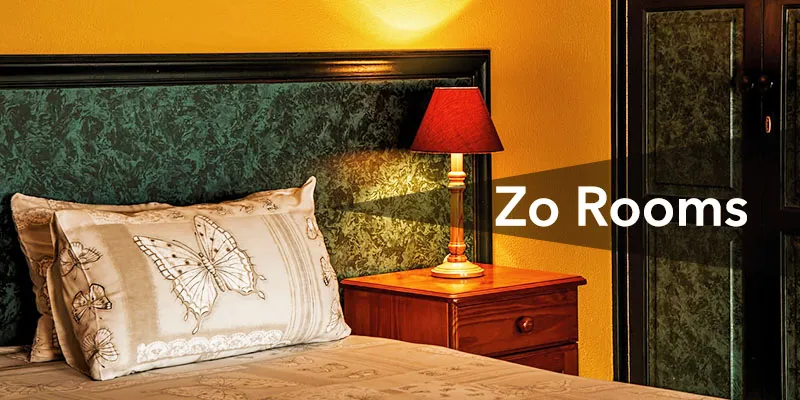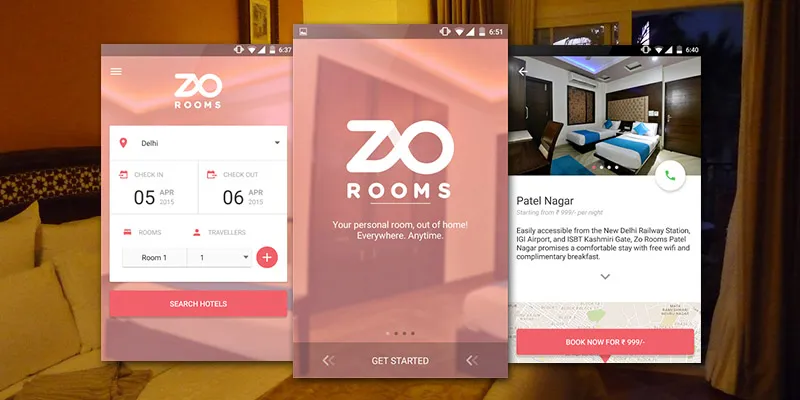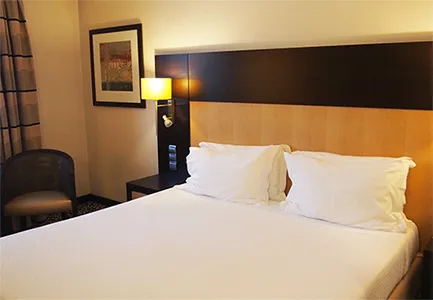Zostel founders dive into the low-budget hotel space with Zo Rooms
Getting reasonably-priced accommodation in metros was a big challenge, to say the least. But fortunately for the hapless budget traveller things changed when startups like Stayzilla and Oyo Rooms came into existence. While Stayzilla takes a marketplace approach towards low-budget accommodation, Oyo opts for an inventory-led model..

And now arrives a new entrant -- Zo Rooms from the founders of Zostel. Zo Rooms is a low-budget hotel chain that enables users to book rooms through a mobile-app. The app geo-detects a location and books into the nearest Zo Rooms available at a single touch.
“We are hyper-local and have further divided a city into zones and localities. Other hotel chains would ideally have a couple of hotels across a city but we believe in ‘being accessible’, hence we make sure that you get a place right there where you want,” says Paavan Nanda, Co-Founder, Zo Rooms.
Zo Rooms claims to be the only hospitality service provider in the world in the budget segment that has tablets installed at each property to record instant feedback and immediately address the issues.
Size of opportunity and traction
India is short of 150000 budget hotel rooms, and it’s an over $20 billion opportunity and growing at a high double digit rate. A good portion of this demand is fuelled by the emerging tier one and three cities where there is a severe dearth of quality accommodation. “A lot of international chains are trying to enter tier two and three cities but what’s really required is an asset-light approach to uplift the existing infrastructure if we want to chase this high demand-led growth,” adds Paavan.
Zo Rooms is growing at an encouraging pace for its founders. On the supply side, it’s currently adding two properties on a daily basis and has opened 100 odd hotels across Delhi, Gurgaon, Noida, Mumbai, Bengaluru, Hyderabad, Jaipur, Goa, Jodhpur, etc., in four months. Unlike other hotel chains, which offer a handful of properties in a city, ZoRooms has a locality-level presence. This significantly reduces the guests’ intra-city travel time.
“We have experienced a very welcoming response across online as well as offline channels and are currently sitting at 15000 room nights a month. This number is going to significantly go up post our recent social media and mobile app launch. We have also signed up with more than 20 MNCs to be their accommodation partner,” reveals Paavan.
The reason behind Zo Rooms accelerated growth is its technology offering. A majority of unbranded hotels are not sophisticated enough to manage their online listing, bookings, and customer reviews. “There is enough resistance to invest in installing inventory and property management software. Also, a lot of them don’t have sufficient clarity on the essential requirements of today’s tech-savvy budget traveler,” points out Paavan.
Zo Rooms tries to eliminate these tech shortcomings. “We manage the online presence of our partner hotels and first chain of hotels that install mobile tablets at their hotel reception. These tablets help us manage live inventory and ensure a one-touch check-in in no time,” says Paavan.
The company charges a percentage share of the sales that is generated through Zo Rooms’s platform. “This number is comparative to an OTA but the kind of value-add that we bring on the table for our partner hotels is significantly higher,” says Paavan. Unlike some of the other players in the market, Zo Rooms doesn’t pre-buy inventory from hotel owners and sell it at discounted rates. “We like to keep it sustainable and capital-efficient,” he adds.

What led Zostel to dive into the budget hotel space?
“We work on a single motto - ‘Changing the way India Travels’. Zostel is a first mover, market-shaper, and now a market leader in its category,” says Paavan. Through the Zostel Entrepreneurship Programme, the company is going to launch 30 Zostels in the next four months, and plans to go global by the end of 2015.
“Zo Rooms, although in a similar space, addresses a very different challenge. With the emergence of corporate travel and ever-increasing mobile penetration, India wants a reliable brand of budget hotels that is available at every locality within a city,” explains Paavan.
The founders discovered that there was a high degree of uncertainty with unbranded hotels – wrong pictures, fake reviews, dicey booking statuses, non-functioning amenities, and unhygienic surroundings. “Zo Rooms started with a vision to clean this space and provide a suave, tech-savvy option of accommodation to today’s youth,” says Paavan.
Dead inventory is a big challenge
“As mentioned, our tablets installed in each hotel help us to do a live tracking of the available inventory across Zo Rooms,” adds Paavan. The platform has a dedicated revenue maximisation team that takes cues from existing occupancy levels and historic data trends to come up with dynamic pricing, including last minute deals.
“Having said that, there is hardly any dead inventory as we work on ultra-high occupancy levels on the north of 85 per cent, which is higher than the industry average of 50 -55 per cent,” adds Paavan.

Road ahead
The four-month-old Zo Rooms owns 100 hotels across 10 cities. “By December 2015 the company plans to have 1000 plus hotels across 50 cities in India on its platform. “There is a lot of hard-work that’s going in cleaning this sector,” concludes Paavan.
Leveraging technology in the budget accommodation space is the need of the hour as decent accommodation in tier II and III cities is rare. Besides Zo Rooms, Oyo and AwesomeStays among others have been trying to crack this segment. Oyo had recently raised $25 million from Lightspeed Ventures and Sequoia Capital.
The budget hotel industry is a $20 billion industry in India and there is scope for more startups. This space is also going through an interesting phase. Stay tuned for more updates.







